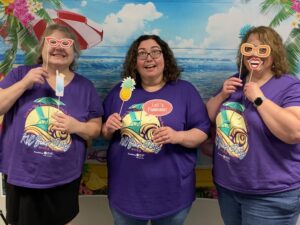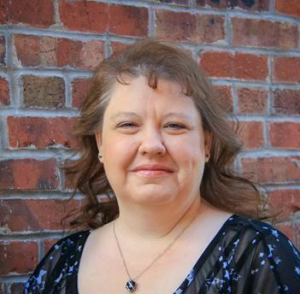Bringing Family Legacy to Life at KVC

Family roots run deep. No matter our background, we can’t ignore families’ impact on our past, present and future. These roots — whether birth family, nontraditional family, chosen family or otherwise — help to establish a foundation for our identity, and give us a sense of how to relate to the outside world.
Traits like eye color, hair texture and even the shapes of our faces are passed down from parents and grandparents. Along with the inherited physical traits, we can also inherit learned behaviors and trauma from our families. Learned behaviors (healthy or unhealthy) are repeated until something changes the pattern.
Kelli Anderson, Child Placement Agency Training Specialist with KVC Nebraska, works to improve the communities she serves by providing support, training and resources to the families in the foster care community. Her upbringing and professional observations have solidified her belief that “family is the bedrock of society”. She believes children and families can heal their wounds and improve their generational issues. Her story about the intersection of her family background and professional work made her a recent winner of KVC’s story contest. See how her story illustrates KVC’s commitment to connection, families and community.
Kelli Anderson’s Story
I have been with KVC Nebraska for over 10 years and have worked in child welfare for 20 years. Recently I lost my father, and through this loss, I’ve thought a lot about my life and purpose. Even though I was adopted at birth, I still struggled over the years with my identity and finding myself. I had some VERY difficult teen years. My parents showed me love and support while still providing boundaries and consequences.
Our family motto is “FAMILY PRIDE.” The love and support from my family taught me how important family is and shaped my belief in family as the bedrock of society. When families are not healthy or doing well it negatively affects our whole society.
 I have recognized over the last 20 years how intervention and support can help families/children grow and heal. I have witnessed so many children improve educationally, emotionally and behaviorally and heal past wounds so they can be successful. I have watched foster parents learn and grow to be able to meet the needs of the children in their care. I have observed them connect and support families of origin throughout a child’s time in care, after adoption or after reunification to create a new family meeting the needs of the child. I have been present for the changes and choices families of origin have made for themselves and their children so their futures can be bright.
I have recognized over the last 20 years how intervention and support can help families/children grow and heal. I have witnessed so many children improve educationally, emotionally and behaviorally and heal past wounds so they can be successful. I have watched foster parents learn and grow to be able to meet the needs of the children in their care. I have observed them connect and support families of origin throughout a child’s time in care, after adoption or after reunification to create a new family meeting the needs of the child. I have been present for the changes and choices families of origin have made for themselves and their children so their futures can be bright.
Some days are hard, some days we cry and some days we feel on top of the world and swell with love and pride for the families/people we work with. Remembering all the while “it is the courage to continue that counts” – Winston S. Churchill.
Anderson’s story brings up themes common with so many families. As an integral part of her upbringing, her father taught her many valuable lessons in life. He wanted to pass on the importance of leading by example and being a good role model for the people around her with character.
Anderson’s father built a healthy familial foundation for her. She can now take the knowledge from her upbringing and transfer it into bettering the lives of the families in her community through her career with KVC.
Why Family is at the Core of KVC’s Work
Anderson says, “Family is the rock” of our stability within the world. She explains that generational issues within families get passed on to children and perpetuate over and over. When a child is taught and witnesses their family’s way of life, they may repeat that cycle with their own families later in life. Therefore, unhealthy patterns will continue until someone disrupts the pattern.
Many mental health professionals agree that trauma isn’t always derived from a one-time event that a person experiences, like a car accident, for example. Sometimes, trauma is generational, meaning a person experiences struggles from chronic harmful events that their family or community was exposed to. Generational trauma (also called intergenerational trauma) can happen as a result of poverty, child abuse, divorce, substance abuse or even things like natural disasters and war, passed down through generations.
Research suggests that generational issues, trauma, and changes have been found to affect children and families in a multitude of ways, including:
- Learned Behaviors: These are behaviors that are modeled and taught. They are often a part of our family life and culture. Some examples include our language and speech, actions and attitudes, and our beliefs.
- Added Risk of Experiencing Mental Health Illnesses and Addiction: Anxiety, Depression, and Post-traumatic Stress Disorders are common generational trauma symptoms.
- Effects on Physical Health: Destabilizing and traumatic events take a toll on our bodies. One study showed a correlation to an increased dysfunctional immune system due to trauma from older generations.
When family issues are present (generational or not), children are at risk of experiencing these traumas and repeating the cycle as adults. It’s the mission of those working with the families at KVC to help break generational issues and support families in their healing and positive growth for future generations.
How KVC Aims to Help Families?
Many families working with KVC are dealing with the effects of generational trauma, causing potential added damage to a child’s health and wellbeing. The only way to end the cycle of trauma is to heal and prevent it through education, processing and treatment. For all families, KVC provides services like Intensive Family Preservation, Substance Abuse Treatments and a variety of therapies to help families address issues that make life difficult. As Anderson says, it’s about “doing what we can to help families heal.”
“We don’t want children to be removed from their homes or family members separated for other reasons, like addiction,” she says. “We want to try and help people before they get to the point where they meet interventions that have negative consequences for families.”
The addressing, processing and healing of trauma for family members take time and effort on behalf of everyone involved, and children need a safe place to land (usually in foster care) until they can safely return home.
KVC’s work is ongoing. Once a child is safely placed into a foster family, KVC continues to work with the family of origin through treatments, therapies, and training, if and until reunification is possible. It’s also necessary to provide training and support to the foster family to help show the child a safe and healthy way of life. Here at KVC, our team sees a better outcome for our society. They are dedicated to making a positive impact in the lives of the children and families they serve — breaking the cycles and creating a brighter future.



